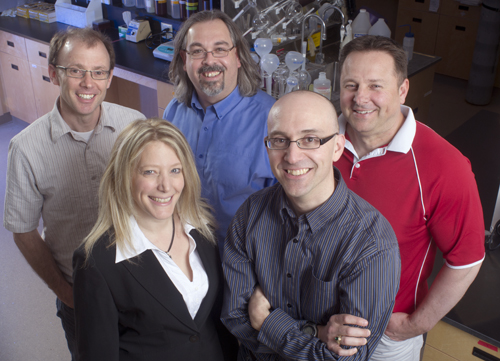
They’re all heart, and they’re all here. Researchers at the University of Guelph are set to launch one of the few groups worldwide looking at cardiovascular disease all the way from single molecules to animal models.
By joining forces across campus, the group members hope to learn more about what causes cardiovascular disease and point the way to tackling a leading cause of death in Canada.
In 2006, heart disease and stroke killed more than 69,000 Canadians − about 30 per cent of all deaths that year, according to Statistics Canada. Cardiovascular disease cost Canada’s economy more than $22 billion that year in physician and hospital costs, lost wages and reduced productivity.
Referring to heart disease, integrative biology professor Todd Gillis says: “In order to cure it, you have to understand it.”
He’s one of six U of G scientists who share equipment and students, collaborate on grant proposals and work together on projects within the new research group. Three are biomedical scientists in the Ontario Veterinary College (OVC) and three are researchers in the College of Biological Science (CBS).
Prof. John Dawson, Molecular and Cellular Biology, says the Guelph researchers range from biochemistry to veterinary science. “The group covers the entire scale of heart disease, all the way from molecules through tissues, through organs (the heart) to the whole animal.”
Elsewhere, individuals or groups study parts of that research chain. But Dawson knows of no similar heart research group in another university with a vet college.
Collaborative research has become a mantra for everyone from scientists to university administrators to granting agencies and funding partners. Guelph’s heart researchers receive funding from such agencies as the Natural Sciences and Engineering Research Council, the Canadian Institutes of Health Research, and the Heart and Stroke Foundation.
Dawson says the new U of G group is “an emerging group of scientists who have been brought up to believe in interdisciplinary research. We all understand that’s the way we want to do research.”
There’s another benefit, says Prof. Glen Pyle, Biomedical Sciences. Angina or chest pain, heart arrhythmia, clogged blood vessels, heart failure following a heart attack or disease: numerous aspects make heart disease a big, complex problem. The more minds brought together, the better, he says.
Pyle has already forged research ties between his OVC lab and Dawson’s quarters in U of G’s science complex. Looking for causes of congestive heart failure led the biomedical scientist to marry his physiological studies of heart signalling and cellular mechanisms with Dawson’s expertise in heart muscle proteins. They’ve published studies on genetic mutations causing dilated cardiomyopathy (“weak heart”) in dogs. By looking at the condition in Doberman pinschers, which are particularly susceptible to heart disease, the researchers hope to learn more about heart failure, and prevent or reverse damage in people.
Animal models also help biomedical sciences professor Ron Johnson to induce and study heart attacks. He looks at what happens during these events and during subsequent heart failure, particularly the role of veins in cardiovascular disease. He’s also intrigued by how the body initially compensates for heart-related stress but then effectively “decompensates,” causing more damage.
Prof. Tami Martino, Biomedical Sciences, studies how circadian rhythms affect heart disease. If your body clock falls out of sync with day-night cycles – as with shift workers or people with sleeping disorders – you may be more prone to heart attacks and worsen underlying cardiovascular disease and outcomes.
More incidents occur during wake time than during sleep, and your immune system behaves differently from night to day. “It’s almost like it’s a different disease,” says Martino. In a paper published this spring in the Journal of the American College of Cardiology, she and Prof. Jeremy Simpson, Human Health and Nutritional Sciences (HHNS), show how time of day alters effects of ACE inhibitor drugs for treating hypertension and congestive heart failure.
In adjoining labs at OVC, she and her departmental colleagues share students, technicians and equipment, including imaging systems, a core proteomics facility and a surgical suite.
Now they’re looking across campus and into all three departments in CBS.
Along with Pyle, integrative biologist Gillis has studied how proteins work in the heart. They’ve looked at what happens when heart muscle thickens, a leading cause of sudden cardiac death in young athletes.
Gillis has also worked with biochemist Dawson, inserting animal genes – including human genes – into bacteria to make heart muscle proteins for study. Learning how genetic mutations alter those engineered proteins can help in understanding heart disease. Says Dawson: “We’re one of the few groups in the world that can make these muscle proteins.”
Gillis will publish three papers this spring on cardiac regulation in fish. “We’re down at the building blocks of the heart,” he says.
That’s also the focus of Simpson in HHNS, who uses animal models to study what goes wrong at the molecular level to cause heart failure. He has worked already with Johnson, Martino and Gillis on the heart and vascular system, effects of daytime heart attacks and treatment, and connections between heart problems and other organ systems. Working with Toronto researchers, he’s looked at molecular pathways in Noonan syndrome, a congenital disorder that affects many organs, especially the heart.
“Heart failure is incredibly complex and not one single person is going to understand it. We need to tackle it from different angles,” says Simpson.
Besides research, group members teach related courses at Guelph. This past semester, for example, Pyle taught an inaugural cardiology course to senior undergrads.